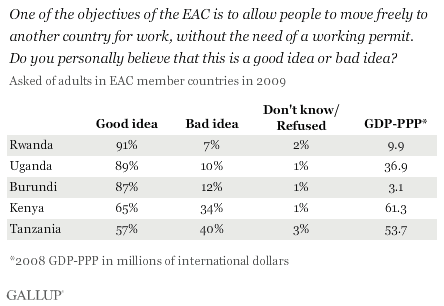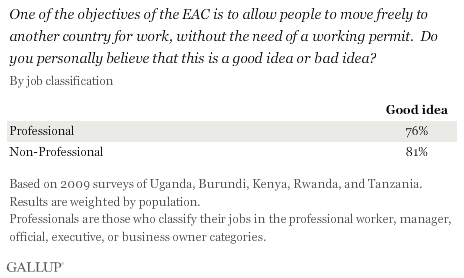WASHINGTON, D.C. -- Services, capital, and labor should move more freely when the East African Community (EAC) common market opens Thursday, but people will still need permits to work in most of the five partner states. Although only Rwanda has eliminated work permits and Kenya looks to follow suit, Gallup surveys last year show the idea of moving freely for work within the EAC is popular in all countries.

Majorities of Tanzanians (57%) and Kenyans (65%) saw free movement for work without a permit in a positive light, but they were cooler to the idea than Rwandans (91%), Ugandans (89%), and Burundians (87%). In the same survey, Gallup also found Tanzanians and Kenyans -- whose countries have much higher GDPs than the other respondents' countries -- least likely to see their countries gaining from the EAC.
Professional, Non-Professional Workers Favor Idea
According to EAC Secretary General Juma Mwapachu, eliminating the work permit requirement for professionals is the starting point for realizing the full benefits of free movement within the common market. The idea of free movement, however, appeals to professionals (76%) and non-professionals (81%) alike in the EAC countries surveyed.

For complete data sets or custom research from the more than 150 countries Gallup continually surveys, please contact SocialandEconomicAnalysis@gallup.com or call 202.715.3030.
Survey Methods
Results are based on face-to-face interviews with 1,000 adults each in Burundi, Kenya, Rwanda, Tanzania, and Uganda. All respondents were aged 15 and older, and the surveys were conducted in Burundi in July and August, in Kenya in April, in Rwanda in August, in Tanzania in November, and in Uganda in May and June 2009. For results based on the total sample of national adults, one can say with 95% confidence that the maximum margin of sampling error ranges from ±3.5 percentage points in Burundi to ±4.2 percentage points in Tanzania. In addition to sampling error, question wording and practical difficulties in conducting surveys can introduce error or bias into the findings of public opinion polls.
